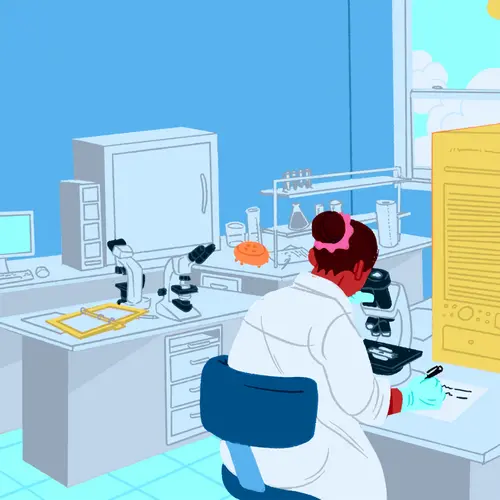A ketogenic (keto) diet is a very high-fat, low-carbohydrate way of eating. It can help you lose weight by forcing your body to burn fat instead of carbs as its main source of energy.
There is interest in how a ketogenic diet may help treat some types of cancer. One theory is that cancer feeds on the sugar you eat, but a high-fat diet starves the tumors.
So far, no major cancer group recommends keto diets for either prevention or treatment of cancer.
How Keto May Affect Cancer
The standard diet recommendation is to limit fats to no more than 30% of your calories. Carbs should make up half or more of your daily total, with protein filling the rest. But a keto diet flips that formula. You eat as much as 90% of your diet in fats, with little or almost no carbs from foods like pasta, beans, and fruits.
Without enough carbs, your body switches to burning fat for fuel. That process, called ketosis, breaks the fat down into molecules called ketones.
But cancer cells are rewired to get most of their energy by quickly breaking down lots of glucose, a form of carbohydrates called simple sugar. A keto diet may shortcut the feeding because some cancers can’t use ketones to grow.
That has led to hopes that a ketogenic diet may help boost the powers of chemotherapy and other cancer treatments.
What the Research Says
Studies have suggested some possible benefits of a very low-carb diet in cancer therapy. Research on mice and small trials on humans show that a keto diet may work in several ways. It may:
- Slow tumor growth
- Protect healthy cells from damage from chemotherapy or radiation treatment
- Help anti-cancer drugs work faster or better
- Ease inflammation, which can encourage cancer growth
- Help prevent weight gain during and after chemotherapy for breast cancer. Extra weight raises the chance that tumors may come back.
There have not been any large studies in humans yet, so we don’t know for sure if and how keto diets work against cancer. Several clinical trials are ongoing.
Unanswered Questions
Cancer is a complicated disease. Many types and subtypes of cancer can strike in different places, including organs, tissue, bone, and blood. And the same cancer can act differently from one person to the next.
Research so far suggests that if and how the keto diet helps fight cancer may depend on many things. Here are some of the key riddles that scientists are trying to solve:
What types of cancer can keto help ease? Some of the strongest reports of keto’s possible benefits have come from glioblastoma, a very aggressive brain cancer. But it doesn’t seem to work on other kinds of brain cancer. There has been very limited evidence that a high-fat, low-carb diet may help suppress solid cancers in the prostate, breast, stomach, and liver. But researchers have not ruled out the possibility that a keto diet may actually worsen your cancer by promoting tumor growth. And very low-fat diets have shown to lower the chances that certain types of breast cancer may come back.
How exactly does the keto diet help fight tumors? Researchers aren’t sure what a diet high in fats and very low in carbs does to cancer cells; they aren't even sure if it helps or causes harm. But they think starving the cancer isn’t the only way. For example, studies have shown that keto may also change the expression of your genes, which in turn controls the way your cells behave.
How much and what types of fat works best against cancer? We will need more and better studies to know the best ratio of fats in your diet. One study suggested that a three-part mix of long-chain triglycerides (fats such as canola or safflower oil) and one part medium-chain fats such as coconut oil may have stronger anti-cancer powers than all long-chain triglycerides. Researcher also want to know if there is an ideal share of your total calories that should come from fats, carbs, and protein.
Risks
A ketogenic diet may worsen your cancer. Some keto-friendly foods like red meat can raise your chances for cancer. It’s also a difficult diet to stick to because of the limited food choices.
But if you get careful monitoring and regular checkups with a diet counselor, your doctor may feel comfortable having you follow the keto diet during treatment, especially if your cancer is aggressive or in early stages. Informal studies have shown that you are not likely to have any serious negative reactions to keto.
Talk to your doctor or oncologist if you’re thinking about adopting the diet.

